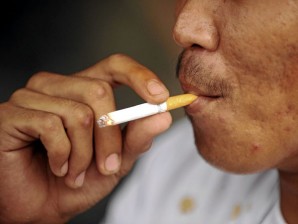Survey shows Sin Tax Law helped reduce smoking
MANILA, Philippines—The Sin Tax Law has proven to be effective in reducing tobacco consumption among the youth and the poor, according to a survey conducted by the Social Weather Stations.
The results of the Department of Health-commissioned survey was presented by the health department in connection with the observance of the World No Tobacco Day on Saturday, May 31.
The survey, which involved 1,200 respondents nationwide and was conducted in March 2014, was aimed at assessing the effect of Republic Act 10351, otherwise known as the Sin Tax Law, more than a year after its implementation.
The study showed that the prevalence of smoking for those belonging to socio-economic class E or the very poor dropped from 38 percent in December 2012 to 25 percent in March 2014. Across age groups, smoking prevalence among those belonging to the 18 to 24 age group was also reduced from 35 percent in December 2012 to 18 percent in March 2014.
“Although we’ve been only a year in the implementation of the Sin Tax Law, we are glad to already see a decrease in smoking prevalence among the youth and the poor, the main groups we aimed to protect through the law,” said Health Secretary Enrique Ona said in a press statement.
Article continues after this advertisementThe survey, however, also showed that while there was a reduction in cigarette consumption among population sub-groups, the overall smoking prevalence in the country had not yet significantly decreased since the law took effect.
Article continues after this advertisementAmong smokers belonging to socio-economic class ABC, smoking prevalence went down only from 25 percent in December 2012 to 20 percent in March 2014, while Class D even went up from 26 percent to 27 percent during the same period.
There was also insignificant changes in tobacco consumption among other age groups, the survey showed.
Health authorities said one possible reason for this could be the smokers’ shift to less expensive brands.
Based on the survey, 45 percent of smokers switched to another brand of cigarettes when prices increased.
Almost seven out of 10 (67 percent) of Filipino smokers buy cigarettes per stick, making it more affordable than buying per pack. According to the survey, median price of cigarette per stick in the country is P3 in spite of the price increase.
“Reducing overall prevalence of smoking in the country will take some time. The implementation of the Sin Tax Law is in its initial stage and we are very hopeful that it will reach its goal of reducing overall smoking prevalence in the country as tobacco taxes continuously increase each year,” said Ona.
The DOH has expressed confidence that the effect of the Sin Tax Law will also be felt among other socio-economic classes and age-groups later on.
